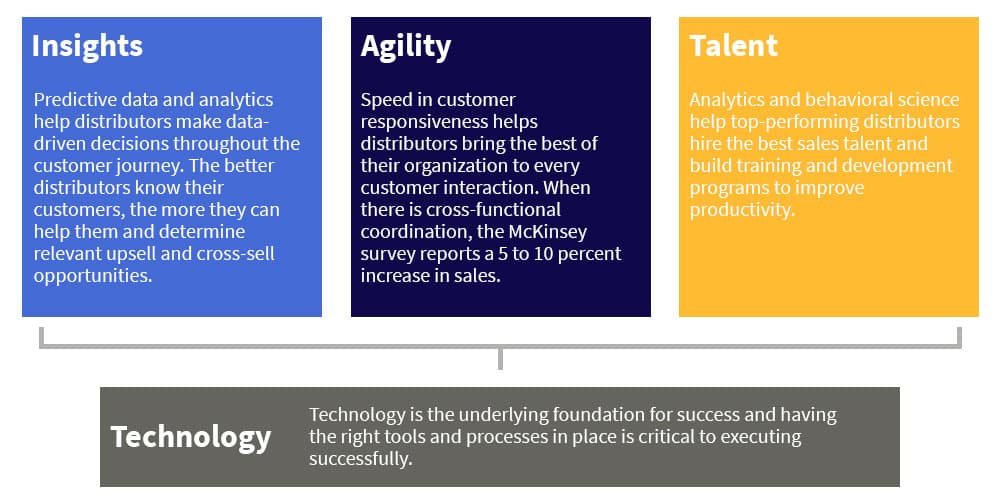Most distributors realize they aren’t doing enough to transform their sales organizations and support their sales teams. This includes leveraging data, restructuring their sales force to meet changing customer behavior, and adopting digital tools to help sales reps target and convert more sales.
According to a recent McKinsey survey of 2,500 B2B companies, the time for distributors to embrace AI technology and “shake up their sales models” is now – not later. An early jump into these next-generation capabilities could potentially grow revenue at twice the rate of the economy.
When top performers shake up their sales models to drive sales growth, they start by nailing the basics in three key areas: insights (analytics and data to drive decision-making), agility (support in every channel) and talent (strength of sales team). They realize exponential gains when they build out specific capabilities in each area.
- Insights: Predictive data and analytics help distributors make data-driven decisions throughout the customer journey. The better distributors know their customers, the more they can help them and determine relevant upsell and cross-sell opportunities.
- Agility: Speed in customer responsiveness helps distributors bring the best of their organization to every customer interaction. When there is cross-functional coordination, the McKinsey survey reports a 5 to 10 percent increase in sales.
- Talent: Analytics and behavioral science help top-performing distributors hire the best sales talent and build training and development programs to improve productivity.
Technology is the underlying foundation for success and having the right tools and processes in place is critical to executing successfully.

3 ways to drive sales growth, according to the research
Some companies fear that they won’t get ROI when adopting technology. The data reveals the opposite is true. Here are three takeaways from the McKinsey research to drive sales growth.
Top performers embrace granular analytics.
The fastest-growing organizations prioritize data and analytics, using analytics down to the account level to identify and act on opportunities.
In fact, 3 out of 4 of the fastest-growing B2B companies say they apply analytics such as sales planning, compared to only 2 out of 4 of the slowest-growers. Further, 2 out of 3 apply analytics on deal and account-level opportunities to determine buying patterns, likelihood to buy and more. AI-powered sales tools add immense value and help reps find the information they need to be strategic and have consultative sales conversations with each customer. When a sales rep pitches relevant products suggested by AI, it can result in a 10X increase in revenue per pitch.
Top performers put the customer first.
Another important takeaway from the research was that high-performance companies put the customer first to help find best-fit solutions. By putting all customer interactions in one place, an AI-powered sales platform helps connect and align sales data across channels and ensures no data is lost. This helps sales reps stay on top of recurring customer needs.
Using an AI-enabled semantic search of PDF sell sheets, documents and other product data, sales reps can quickly find information to answer and respond to customer requests in seconds. Without AI, it could take sales reps hours to sift through all the details on their own or wait for a manufacturer to respond. Also, AI powers engines that can give customer-specific product recommendations on ecommerce sites or inform sales reps what might be helpful to that customer based on buying history.
Top performers use digital tools that users embrace.
And finally, sales organizations that are top performers have adopted smart digital tools that their reps don’t ignore – like those with poor interfaces, unclear use cases or confusing recommendations. Strong adoption and sales follow when tools are intuitive, easy to use and can automatically log every customer interaction. High-performance B2B companies are 62% more effective in using digital tools than lower-performers according to McKinsey. Plus, the more sales reps use AI-powered tools, the more data is acquired and analyzed. This ultimately results in even smarter AI models that help reps make more effective pitches and increase revenue – a win-win-win.
There’s no time like the present for distributors to set aside resistance to change and explore how AI can shake up sales models, help their sales reps succeed and generate more revenue.
Benj Cohen founded Proton.ai, an AI-powered CRM for distributors. His company’s mission is to help distributors harness cutting-edge artificial intelligence (AI) to drive increased sales. Benj learned about distribution firsthand at Benco Dental, a family business started by his great grandfather. He graduated Harvard University with a degree in Applied Math, and speaks regularly at industry events on the benefits of AI for distributors. Benj has been featured in trade publications including MDM, Industrial Distribution, and Industrial Supply Magazine. His company, Proton.ai, announced a $20 million Series A round of funding in 2022, led by Felicis Ventures. In 2023, Benj was recognized in Forbes 30 Under 30 – the first leader in distribution to receive such recognition.

